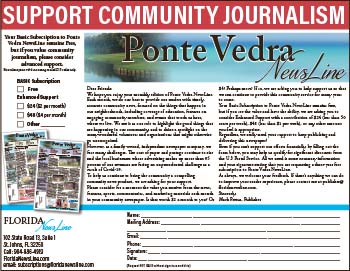By Tiffany Merlo Phelps
mail@floridanewsline.com
When it comes to volunteering to look for North Atlantic Right Whale mothers and their calves, it is important to be enthusiastic, committed, and willing to learn. Above all, one must possess a great deal of patience.
“When people think of whale watching, they think they will be out on a lovely boat, and whales will be frolicking around the boat. That’s not this kind of whale watching,” said Shea L., Team 1 North co-leader. “There are less than 360 of these individual whales. Of that group, about 70 – 80 are reproductive females. Of that group, only 15-ish, if we are lucky, reproduce in any given year. So, we tell people that it is literally like looking for a needle in a haystack.”

Still, it is incredibly important and rewarding work for volunteers, especially Shea L. and Team 1 North co-leader Kim Jacomo, who have been doing so for three years.
Team 1 North, which was created in 2022, covers the beaches of Mickler’s to Vilano, a sector that spans about 22 miles and includes seven to 12 stops or watch/elevated observation points. That stretch of beach contains an important migration lane for the whales who are on the move in search of warmer waters, primarily from January to March. Shea L. noted that these mothers will travel all the way from Canada, a total of 1,500 miles, just to have their babies here. Volunteers look, survey, and record data during this time in hopes of protecting the Right Whale which tends to be elusive in nature and dwindling in numbers.
“If you see one or two a season, that’s a fabulous season,” said Shea L.
Team 1 North falls under the jurisdiction of the Marineland Right Whale Project, which was created 23 years ago by Dr. Jim Hain to monitor, advocate, and ultimately help the whales survive. Today there are 190 “citizen scientists.” Shea L. said citizen scientists are everyday people who become the eyes and ears and recorders for the scientists, a totally volunteer effort that is much needed for these beautiful creatures. All data is sent to and used by Woods Hole Oceanographic Institution. Two scientists from Woods Hole Oceanographic Institution also work with local volunteers on site for the season.
Once a Right Whale is spotted and the hotline is alerted, vessels in the area are put on notice to slow down and to stay clear of the whale for at least 500 yards. Next, a plane, drone, or boat will assist in identifying and documenting the whale.
For volunteers, it is an invigorating and exciting moment.
“We drop everything and go. We spend the day with them,” said Jacomo.
Members of Team 1 North are divided into groups of three to four people, each visiting at least seven of the 12 locations and committing to about three to four hours to do so while also keeping binoculars on the water. Weather and sea conditions, wildlife activity and other unusual sightings such as sunfish, humpbacks, sharks, gofer tortoises and various shorebirds are all documented.
Jacomo said she felt a pull to volunteer and, after attending one meeting at Marineland’s Whitney Laboratory, she knew she had found her purpose. Shea L. got involved after responding to a social media post by Jacomo and was driven by a sense of social and environmental responsibility.
“The Atlantic Right Whale is one of the most critically endangered whales on the planet. To just be a part of that to bring back their numbers as well as be out on the beach, it is the perfect combination,” said Shea L. “We live in Florida. At our doorstep is an amazing ecosystem, and it is our job to take care of it.”
Jacomo and Shea L. said the experience is very personal, and they often know the Right Whales by name and feel the loss of any Right Whale deeply. Vessel strikes and fishing line/trap entanglements tend to be the biggest obstacles for Right Whales on their journey. Progress, albeit slow, said Shea L., is being made to help prevent these injuries and to raise more awareness.
[Author’s note: If you see a right whale, call 888-97-WHALE. If you are interested in volunteering, call Kim at (703) 795-6122 or Shea at (618) 978-7841.]
Photo courtesy Kim Jacomo
A volunteer of Team 1.







